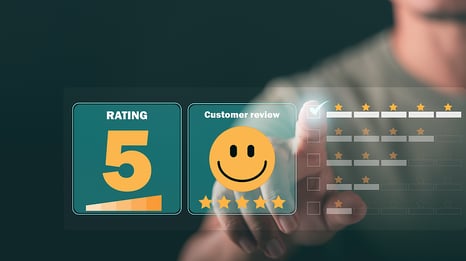How a Powerful Data Monetization Strategy Turns Data into Revenue
Topic:
Data Strategy
The Gartner Glossary definition of Data Monetization is “the process of using data to obtain quantifiable economic benefit.” If your data is the gold, then monetization is its conversion to cash value.
You could collect a lot of data, but you might not see a return on its value. It’s like being force-fed with a firehose.
If you’re among those companies that have invested in many systems that collect a lot of data or purchased outside data, you might ask yourself, “why don’t I see an ROI?”
Your data is accumulating, but you’re not growing or profiting.
The problem is that organic growth can only go so far so fast. If you want to accelerate growth, you need to find additional sources of revenue, including areas for significant cost savings. One of those sources is leveraging the data you collect. The process of harnessing those sources through Data Monetization will unleash opportunities for growth and greater ROI.
Another essential element of growth is customer retention and engagement. If your customers are more engaged, they will likely do more business with you, and your revenue will increase. Replacing lost customers is far more costly than going the extra mile to engage them. That engagement is best achieved through delivering modern digital experiences and meeting your customer at their greatest need.
Data Monetization, as you shall see, can be a critical part of that enhanced customer engagement. Data Monetization can solve your stunted growth problems by providing a steady revenue stream. Turning data into a business asset allows you to identify new markets, find new opportunities in existing markets, enhance brand awareness and loyalty, or deliver lucrative data/insights as a service provider to your customers.
So, the question is, how is data turned into revenue?
According to McKinsey & Co., Data Monetization requires “the right combination of strategy, culture, and organization. One of the most highly prized objectives in business intelligence today is Data Monetization because, as previously discussed, it permits your business to generate revenue and reduce costs from the data you possess.
There is an old business adage that ‘Knowledge is Power.’ Knowledge is derived from insights or intelligence that comes from turning data into actionable information. Therefore you need to view your business data as an asset, just like plant & equipment or cash in the bank! Understanding your data and where it has value to internal consumers, external customers, partners, or third parties who will pay for the information locked inside your data are the key features and benefits of Data Monetization.
About this Post
This post will highlight a data monetization strategy that can earn income or value from the data you already collect and store. We will cover the key points:
- The six-step process of monetizing your data and the importance of efficient data discovery
- Getting started with Data Monetization by using outward-facing value-added applications
- Leveraging data to enhance customer loyalty & purchasing, with use-case examples
- Leveraging data to gain operational efficiency, control costs, and achieve better resource allocation
- Making Data Monetization a part of your business DNA and communicating the value of data across the entire organization
A Six-Step Process of How to Monetize Your Data
One of the most important things to do when setting up a Data Monetization framework is first to define the market for the data and build a business plan to service that market.
If your organization has a data-driven culture, you have taken a giant step in monetizing your data. You can then proceed to the following steps where your organization is ready to generate better bottom-line results from the data it already has:
Step 1: Data discovery: defining your data assets and their monetization potential
Step 2: Data capture: scrubbing the data and applying structured business rules
Step 3: Data storage: the process involved in improving your data warehouse systems.
Step 4: Data integration: matching the data with internal business processes
Step 5: Data analysis: done through automated BI technology—dashboards, self-service applications, augmented analytics, etc.
Step 6: Dissemination of information.
The first step is to determine the purpose of disseminating the information based on the audience, message, method, and timing of the dissemination. The challenge is to improve the accessibility of the desired information that will have the greatest impact on those you intended to reach. Other critical factors in how information is disseminated are security and privacy factors. Your data monetization strategy and implementation strategy must factor in the terms and conditions of the Privacy Act of 1974, the Data Protection Act of 2018, and GDPR regulations.
Getting Started with Data Monetization
An effective data monetization strategy views data as a constantly growing asset within the enterprise. The fastest way to Data Monetization is by developing and deploying the above-mentioned external-facing, value-added BI applications that deliver actionable insights.
You can license this valuable data to your customers, prospects, business partners, and others. These external-facing applications can be structured on a subscription model that delivers a stream of revenue into the future for the business.
Leveraging Data to Enhance Customer Loyalty & Purchasing
There is yet another aspect of data monetization that you should not overlook. It is leveraging your data to uncover new opportunities within your market or to extend your existing business deeper into your customer base.
 Data Monetization use-case examples include:
Data Monetization use-case examples include:
- tapping into the customer data within your CRM System and other systems to maximize customer loyalty and retention
- using data to understand buyer patterns of behavior better
- leveraging deeper customer insights to increase your customer’s merchandising effectiveness or to develop targeted marketing campaigns and promotions
These are just a few of the use cases that can directly impact your bottom-line financial performance.
Leveraging Data to Gain Operational Efficiency
Your data can provide tremendous value in helping your business better control your cost structure. For example, your data could uncover inefficiencies within current business processes, which can be improved to reduce costs and improve business outcomes.
Deeper insights into your internal operational data can enable you to Improve resource allocation and eliminate duplication of effort or waste. You can also Identify excess costs and inefficiencies in supply chains, inventory practices, etc.
Data Monetization Strategy as Part of Your Business DNA
Once your business’ data has been monetized, the strategy should become part of the business’ DNA moving forward.
Adopting a Data Monetization strategy requires management commitment to specific organizational changes and targeted technology. All data should be regarded as a business asset and thus treated as you would treat product inventory or cash. This will likely require data management upgrades and dedicated communication plans to realize the full value of this important initiative.
The strategy must include communicating the value of data across the organization. Everyone must be part of a process that captures and leverages the company data they encounter. Likewise, for Data Monetization to become part of the business, careful strategic planning must focus on answering the following:
- What data should be monetized?
- Where does the data come from?
- Is the data clean?
- Can everyone who needs it get to it?
- And, most importantly, is the technology infrastructure in place to support the goals of the initiative?
If the answer to question 5 is no, it could be time to get the assistance of a qualified third party.
Summary Point
Major publications like Forbes, HBR, and industry analysts like Gartner and McKinsey & Company have promoted the importance of data monetization since the early 2000s. Today there are many real-world examples of use cases where Data Monetization has helped companies achieve higher levels of financial performance and market growth.
More and more organizations are monetizing their data to drive revenue, increase productivity, or reduce expenses. Data monetization enables your business to better leverage its information assets to increase the bottom line.
Our data strategy expertise will guide you to achieve excellent outcomes at a lower cost. Hire our consultancy services to help you build and execute an effective data strategy, including monetization.
Discover how you can begin your journey of developing a data monetization strategy that accelerates business growth by downloading the eBook "The Executive's Guide to Building a Data Strategy that Leads to Business Growth & Innovation."

